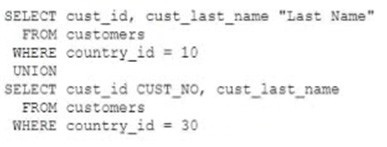Exam Details
Exam Code
:1Z0-071Exam Name
:Oracle Database SQLCertification
:Oracle CertificationsVendor
:OracleTotal Questions
:415 Q&AsLast Updated
:Apr 05, 2025
Oracle Oracle Certifications 1Z0-071 Questions & Answers
-
Question 131:
Which three actions can you perform by using the ALTER TABLE command? (Choose three.)
A. Drop pseudocolumns from a table.
B. Restrict all DML statements on a table.
C. Lock a set of rows in a table.
D. Rename a table.
E. Drop all columns simultaneously from a table.
F. Enable or disable constraints on a table.
-
Question 132:
Which three statements are true about built-in data types? (Choose three.)
A. The default length for a CHAR column is always one character.
B. A VARCHAR2 blank-pads column values only in the data stored is non-numeric and contains no special characters.
C. A VARCHAR2 column definition does not require the length to be specified.
D. A CHAR column definition does not require the length to be specified.
E. A BLOB stores unstructured binary data within the database.
F. A BFILE stores unstructured binary data in operating system files.
-
Question 133:
Which three are true about granting object privileges on tables, views, and sequences? (Choose three.)
A. UPDATE can be granted only on tables and views.
B. DELETE can be granted on tables, views, and sequences.
C. SELECT can be granted on tables and views.
D. ALTER can be granted only on tables and sequences.
E. REFERENCES can be granted only on tables and views.
F. INSERT can be granted on tables, views, and sequences.
-
Question 134:
Which three are true about system and object privileges? (Choose three.)
A. WITH GRANT OPTTON cannot be used when granting an object privilege to PUBLIC.
B. WITH GRANT OPTION can be used when granting an object privilege to both users and roles.
C. Revoking an object privilege that was granted with the WITH GRANT OPTION clause has a cascading effect.
D. Adding a primary key constraint to an existing table in another schema requires a system privilege.
E. Adding a foreign key constraint pointing to a table in another schema requires the REFERENCES object privilege.
F. Revoking a system privilege that was granted with WITH ADMIN OPTION has a cascading effect.
-
Question 135:
Which three are true about privileges and roles? (Choose three.)
A. System privileges always set privileges for an entire database.
B. PUBLIC can be revoked from a user.
C. All roles are owned by the SYS schema.
D. A user has all object privileges for every object in their schema by default.
E. A role is owned by the user who created it.
F. A role can contain a combination of several privileges and roles.
G. PUBLIC acts as a default role granted to every user in a database.
-
Question 136:
Which two are true about the WITH GRANT OPTION clause? (Choose two.)
A. It can be used for system and object privileges.
B. The grantee can grant the object privilege to any user in the database, with or without including this option.
C. The grantee must have the GRANT ANY OBJECT PRIVILEGE system privilege to use this option.
D. It cannot be used to pass on privileges to PUBLIC by the grantee.
E. It can be used when granting privileges to roles.
F. It can be used to pass on privileges to other users by the grantee.
-
Question 137:
Which statement will return the last sequence number generated by the EMP_SEQ sequence?
A. SELECT CURRVAL FROM emp_seq;
B. SELECT emp_seq.CURRVAL FROM DUAL;
C. SELECT NEXTVAL FROM emp_seq;
D. SELECT emp_seq.NEXTVAL FROM DUAL;
-
Question 138:
Evaluate the following SQL statement:

Identify three ORDER BY clauses, any one of which will complete the query successfully. (Choose three.)
A. ORDER BY CUST_NO
B. ORDER BY 2, cust_id
C. ORDER BY 2, 1
D. ORDER BY "Last Name"
E. ORDER BY "CUST_NO"
-
Question 139:
Which three are true about multitable INSERT statements? (Choose three.)
A. They can insert each computed row into more than one table.
B. They can be performed on remote tables.
C. They can be performed on external tables using SQL*Loader.
D. They can be performed on views.
E. They can be performed only by using a subquery.
F. They can be performed on relational tables.
-
Question 140:
In your session NLS_DATE_FORMAT is set to DD-MON-RR.
Which two queries display the year as four digits? (Choose two.)
A. SELECT TO_DATE(SYSDATE, 'RRRR-MM-DD') FROM DUAL;
B. SELECT TO_CHAR(SYSDATE, MM/DD/YYYY) FROM DUAL;
C. SELECT TO_DATE(ADD_MONTHS(SYSDATE, 6), 'dd-non-yyyy') FROM DUAL;
D. SELECT TO_CHAR(ADD_MONTHS(SYSDATE, 6)) FROM DUAL;
E. SELECT TO_CHAR(ADD_MONTHS(SYSDATE, 6), 'dd-mon-yyyy') FROM DUAL;
F. SELECT TO_DATE(TO_CHAR(SYSDATE, 'MM/DD/YYYY'), 'MM/DD/YYYY') FROM DUAL;
Related Exams:
1Z0-020
Oracle8i: New Features for Administrators1Z0-023
Architecture and Administration1Z0-024
Performance Tuning1Z0-025
Backup and Recovery1Z0-026
Network Administration1Z0-034
Upgrade Oracle9i/10g OCA to Oracle Database OCP1Z0-036
Managing Oracle9i on Linux1Z0-041
Oracle Database 10g: DBA Assessment1Z0-052
Oracle Database 11g: Administration Workshop I1Z0-053
Oracle Database 11g: Administration II
Tips on How to Prepare for the Exams
Nowadays, the certification exams become more and more important and required by more and more enterprises when applying for a job. But how to prepare for the exam effectively? How to prepare for the exam in a short time with less efforts? How to get a ideal result and how to find the most reliable resources? Here on Vcedump.com, you will find all the answers. Vcedump.com provide not only Oracle exam questions, answers and explanations but also complete assistance on your exam preparation and certification application. If you are confused on your 1Z0-071 exam preparations and Oracle certification application, do not hesitate to visit our Vcedump.com to find your solutions here.